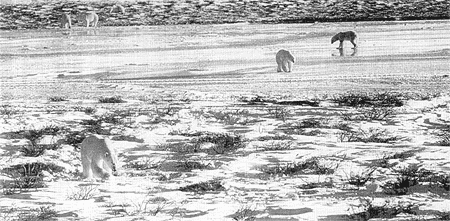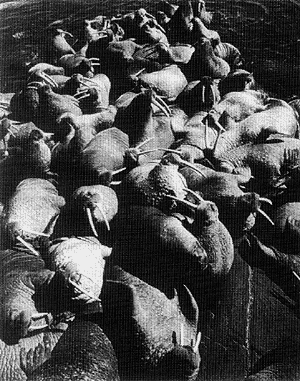
Mammals of the NSR coast (polar bears) (Stonehouse, 1990)
On the basis of the frequency of NSR operations expected in the near future, it is at least clear that the atmospheric pollution caused by exhaust gas and contaminants from marine engines cannot be thicker than the pollution transported to the Arctic by the global circulation of the atmosphere; they are therefore indistinguishable from each other. Probably the pollution by the operation of ships can only be evaluated only in limited areas, such as the NSR ports.
An urgent priority in evaluating impact on ecosystems is to form the necessary databases to carry out impact assessment. Even aside from the NSR project, such databases are an indispensable part of any system for monitoring global ecosystems. Given the difficulty of performing academic research in the Arctic, some monitoring work by commercial vessels in service would be welcome.

Marine mammals in the vicinity of the NSR (walruses) (Stonehouse, 1990)
6.6 Concluding Remarks
INSROP's overall conclusion in its study of the feasibility of NSR shipping is that the majority of the problems lie squarely with Russia. These obstacles run from legal issues to questions of taxation and tariffs. Leaving infrastructure issues to one side, many of the problems in bringing NSR shipping to fruition could be solved by modifying the current systems and revising policies. Many of these policies might be underpinned by a misguided protectionism that fears an invasion of foreign capital and the rapine of Russia's economic resources. It will be suggested that Russia will discard these outdated notions and realize that its national interest lies in joining the global market and the international community, while safeguarding its proud role as a great power in both natural resources and culture. When this happens, many of the problems now obstructing commercial NSR shipping will solve themselves.
BACK CONTENTS NEXT